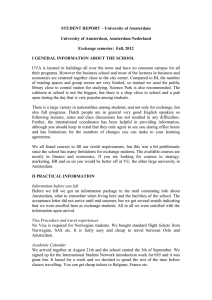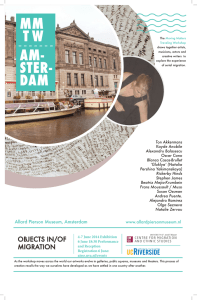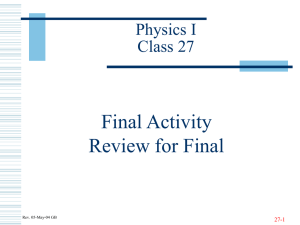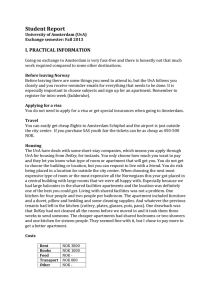Student Report – University of Amsterdam Name of the university: Exchange semester:
advertisement
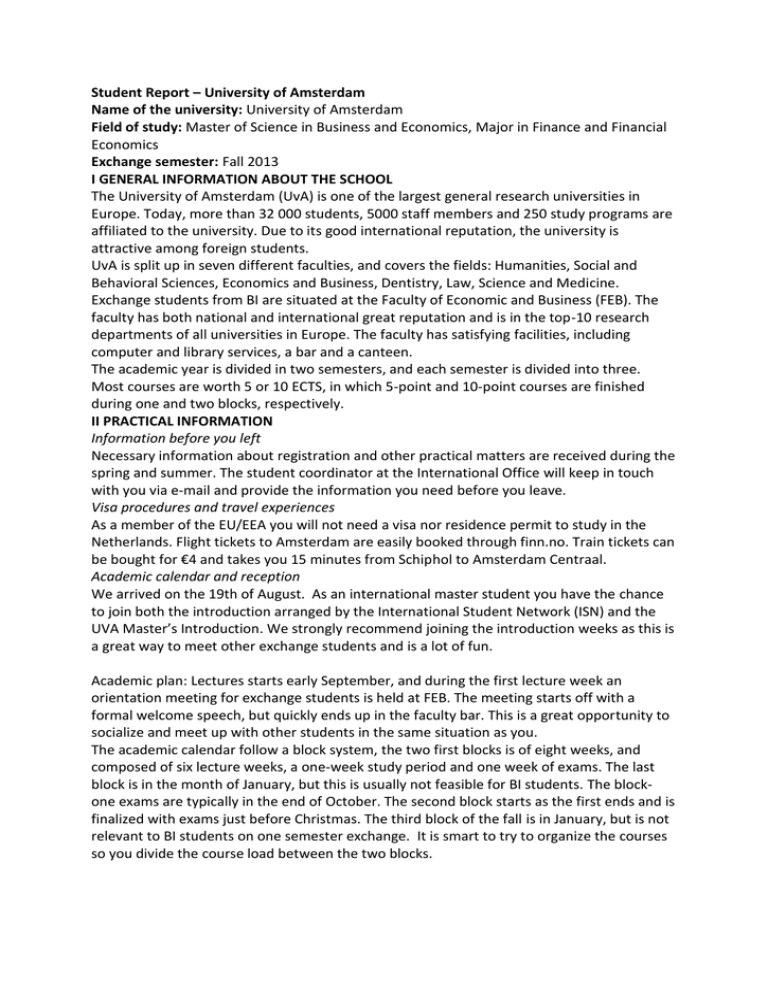
Student Report – University of Amsterdam Name of the university: University of Amsterdam Field of study: Master of Science in Business and Economics, Major in Finance and Financial Economics Exchange semester: Fall 2013 I GENERAL INFORMATION ABOUT THE SCHOOL The University of Amsterdam (UvA) is one of the largest general research universities in Europe. Today, more than 32 000 students, 5000 staff members and 250 study programs are affiliated to the university. Due to its good international reputation, the university is attractive among foreign students. UvA is split up in seven different faculties, and covers the fields: Humanities, Social and Behavioral Sciences, Economics and Business, Dentistry, Law, Science and Medicine. Exchange students from BI are situated at the Faculty of Economic and Business (FEB). The faculty has both national and international great reputation and is in the top-10 research departments of all universities in Europe. The faculty has satisfying facilities, including computer and library services, a bar and a canteen. The academic year is divided in two semesters, and each semester is divided into three. Most courses are worth 5 or 10 ECTS, in which 5-point and 10-point courses are finished during one and two blocks, respectively. II PRACTICAL INFORMATION Information before you left Necessary information about registration and other practical matters are received during the spring and summer. The student coordinator at the International Office will keep in touch with you via e-mail and provide the information you need before you leave. Visa procedures and travel experiences As a member of the EU/EEA you will not need a visa nor residence permit to study in the Netherlands. Flight tickets to Amsterdam are easily booked through finn.no. Train tickets can be bought for €4 and takes you 15 minutes from Schiphol to Amsterdam Centraal. Academic calendar and reception We arrived on the 19th of August. As an international master student you have the chance to join both the introduction arranged by the International Student Network (ISN) and the UVA Master’s Introduction. We strongly recommend joining the introduction weeks as this is a great way to meet other exchange students and is a lot of fun. Academic plan: Lectures starts early September, and during the first lecture week an orientation meeting for exchange students is held at FEB. The meeting starts off with a formal welcome speech, but quickly ends up in the faculty bar. This is a great opportunity to socialize and meet up with other students in the same situation as you. The academic calendar follow a block system, the two first blocks is of eight weeks, and composed of six lecture weeks, a one-week study period and one week of exams. The last block is in the month of January, but this is usually not feasible for BI students. The blockone exams are typically in the end of October. The second block starts as the first ends and is finalized with exams just before Christmas. The third block of the fall is in January, but is not relevant to BI students on one semester exchange. It is smart to try to organize the courses so you divide the course load between the two blocks. Housing To assist international students in finding appropriate accommodation, the university has signed agreements with the housing corporations DeKey and DUWO. These corporations offer furnished accommodation to students for one or two semesters. After you have been admitted to a program at the UvA you will receive an e-mail with a link for the online application for student accommodation. You can expect this e-mail in May. You can apply for either a shared room, private room with shared facilities or a private room with private facilities. You also specify your price range. Based on your specification you are offered a room within a few weeks. The rooms are located all over Amsterdam and prices vary from approximately € 350 to € 600 per month according to type, size and location. We got accommodations from DeKey. The down side is that you have to rent a room throughout January, and will have to pay around €400 in administration fee. You can also find your own room, however, the high demand for student housing in Amsterdam makes this task challenging. Costs Relative to Norway, housing and living expenses are a bit lower. Personally, we paid €500 for a private room with shared facilities. The rent also included plug and play internet connection, heating, and the use of the building’s laundry room. Books and study material costs are similar to Norwegian prices, but not all courses require a book. Articles are uploaded to blackboard and in combination with the lecture may be sufficient in some courses. The International Office The International Office is located at the FEB faculty and has a staff with scheduled office hours. Exchange promotion There was a no organized activity to promote BI. Social activities There are a lot of nice social activities to join arranged by the ISN. There are a lot of exchange students facing the same situation, and everyone wants to make friends. Dutch students are also easy-going and welcoming to internationals. As mentioned, ISN arranges an introduction for exchange students in the end of August and continues to host parties and other social activities throughout the semester. Every Wednesday ISN also organizes a get-together with drinks, in a centrally located bar. Culture and language Amsterdam is a city with a unique atmosphere that gives you plenty of opportunities to experience culture. Good public transport system, makes it is easy to get around the country or to neighboring countries for that matter. Dutch people are pretty similar to Norwegians, so the chance of experiencing a culture clash is small. Most inhabitants of Amsterdam and Dutch students speak English very well, so the language will not be a barrier. English is the city's unofficial second language, so often you also find information in English. However, if you want to learn some Dutch while you are on exchange, both UvA and ISN arrange language courses before and during the semester. Other A bike in Amsterdam is a must! Even though, the city has an extensive transport system, including trams, buses, trains, metros and ferries, it is way more effective to travel using a bicycle. Reasonable second-hand bikes can for instance be bought at the market at Waterlooplein, or at different facebook pages (ISN Amsterdam, Marketplace Amsterdam etc.). III ACADEMIC INFORMATION Teaching situation In which language are the courses taught? Any problems? All courses available for exchange students are taught in English. How would you evaluate the level of study in relationship to the level at BI? A bit lower. Is the teaching primarily practical or theoretical? Most courses have a setup with lectures and tutorials. In the lectures, most professors preach the theory, while the tutorials are more applied. Are the professors using cases, group work or lectures (or a mix)? A mix, depending on the course you take. How is the workload compared to that at BI? A bit lower in general, maybe due to the block system the exams are spread between October and December, lowering the pressure in December. Worth mentioning is that some courses in block two builds on courses from the first block. Furthermore, you should also watch out for time conflicts between lectures/tutorials in different courses. How is the relationship between faculty and students? Most professors encourage two-way communication in the lectures. They also respond well to your questions, both via e-mail or in class, if you have any. What is the relationship between the students in the classroom? The relationship between students is very good. Since the number of students enrolled in each course is pretty low, you get the chance to know your fellow students. Required literature Is the literature in English? Yes. How do you estimate the level of the literature? Similar to the literature used at BI. Is the literature used for detailed knowledge or a broad overview? This depends on the course and lecturer. Is exam based on the literature or on the lectures? Again, this varies between the courses. Exams What types of exams were you given? We had one course that went over two blocks where I was assessed on the basis of a literature review(5%), cases(30%), homework(5%), midterm exam (30%) and a final exam (30%). The other courses had one case or essay accounting for either 20 or 30% and the final exams accounting for rest of the grade. Exams were usually two or three hours. What knowledge level was required to pass the exams? Similar to the requirements at BI. Other Do students have easy access to the library and its resources? There is a library located at the FEB faculty which is open Monday to Friday. The UvA also has other centrally located libraries that are open during weekends. How is the access to the computers? There are several computers at the libraries. In addition, the FEB faculty has a separate computer room with 150+ computers. During the enrollment process you receive your own student login that gives you access to all UvA computers. How is IT used in the teaching or as a distributor of information? All courses use Blackboard as a distribution channel for information. Presentations are normally held using PowerPoint and all assignments are handed in electronically. First four courses were chosen by the student majoring in finance and the last four courses were chosen by the student following the Financial Economics class(only finance courses) Description of courses Courses Regulation Power and Authority in Organizations Advanced Industrial Organization Real Estate Valuation and Investments Commercial Banking Behavioural Finance Financial Mathematics for Insurance Credits Exam/Assignm ents Block Approved as 5 5 80/20 70/30 2 1 Free Elective Free Elective 5 75/25 2 Free Elective 10 50/50 1&2 Free Elective 5 60/40 2 Free Elective 5 70/30 2 Free Elective 5 100/0 1 Free Elective For more information I advise you to visit: http://www.feb.uva.nl/english/home.cfm
